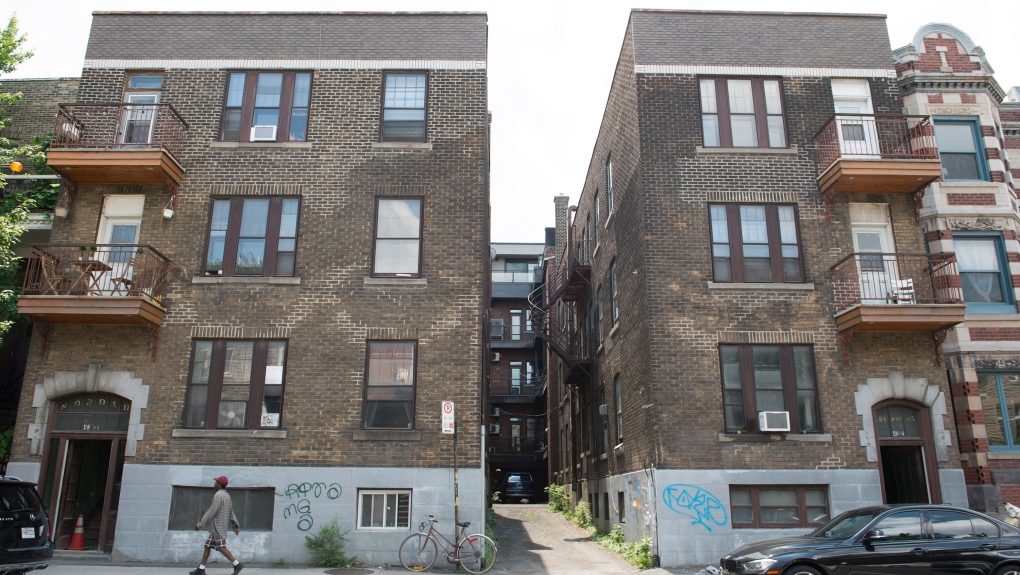According to a new report from Rentals, In July, the Canadian rental market hit a record high with an average asking rent of $2,078, marking an 8.9 per cent annual increase.

Here’s your reminder that Ontario expects disabled people to live on 13k a year.

If they are lucky. Getting disability anything requires 90% luck and a doctor who “has the time” to sign a few documents.

In the US, they assign doctors to evaluate you, only to see you literally struggling to walk/balance yourself, and be told you could “probably work at least 4-8 hours a week, no disability for you, moocher”.
Nevermind that even if said mythical 4-8 hour/week, remote job existed, the pay wouldnt cover jack shit…
And our retirement pension is 760$/month in Canada, lol? At 65yo we will all live in the street

In BC it’s 18k a year for comparison.

Landlords should be outlawed. They provide no service to society, only harm

They’re supposed to fill the gap for people who can’t afford to buy, or for whom it doesn’t make sense to do so (i.e. people in town on a temporary job).
The problem is that “landlords” these days are more towards the class of “investors” who expect rents to cover the cost of their mortgage plus additional profit

Public housing in the Viennese style is the proper way to handle this.

There are lots of ways that gap could be filled. Landlords exist to make profit by filling that gap. They have a financial incentive to maximize returns and minimize expenses, and have the leverage to do so to an exploitative degree.
Another way to accomplish that would be through cooperatives, which are non-profit corporations that exist to provide housing. They have a mandate to maximize utility to their tenants, and have no profit incentive leading them to exploit their tenants.

I wouldn’t mind seeing more of those, but I do also remember a day when there were a lot more landlords who charged reasonable rates without becoming overpriced slumlords.
There’s always incentive to “make a profit” but often enough it was just somebody who had extra space after the kids moved out etc and got a little extra pocket money or even just a slightly less “empty nest” feeling. Some lived in half the house (usually upstairs with a basement suite rented) and a smaller few did get another, smaller place while keeping the “family home” for their kids’ return after university or whatever.
Then people started buying second, third, etc places as investments, and it became about “maximizing investment”. These kinds act like sharks, while serial bad-tenants similarly preyed on the more nieve “good” landlords causing more of them to get out of renting.
Co-ops can definitely be part of the solution, but having better controls and adequate staffing at rental regulatory boards etc would be beneficial to both sides, as well as removing pure-profit incentives.
I’ve got a house currently but I’d be ok with seeing the so-called “market values” drop to something people can afford. I’d welcome better regulation on both sides so that my kids don’t end up paying in gold for mold, but also so that I could potentially find somebody decent/trustworthy farther into the future that I could rent space to (in my home) even the kids move out - for a reasonable rate - without having to worry that they’ll destroy the place and steal the plumbing the moment they move in while I wait on 12mo for arbitration.
Looking at the current rents people are asking, I’d say a “reasonable” rate would be ½ or even ⅓ of what most are asking, but at the same time advertising low rents seems to attract a lot of sketchy people. It’s crazy.
Always has been.
If you buy a 4plex for 2 million now, you have no choice to charge a high rent. But all the 8plex or 16plex from the 80s that are paid in full for years, there is no reason to go from 500$/month to 2000$/month just because

100% agree. Nothing pisses me off more than seeing somebody who bought at decades-old prices trying to justify charging thousands, while at the same time not having invested in maintaining the property (and triple that if they pushed out an existing renter or jacked up the rents on them to “keep up with rates”)

They are the reason why people cant afford to buy. Thats a looot of buildings going for sale if you get rid of landlords. Plummeted prices and mortgage payments. Then we should be focusing from the bottom up afterwards, make sure everyone has some place to live with public housing.

Yup, so take away the ability to grossly profit off the backs of others and allow the scales to balance. There’s no reason we can’t do both by disincentivizing gouging and slumlording while at the same time increasing the creation of more affordable housing.
Hell, if a sliding-scale of fees against # of properties/profit were implemented they could use the revenue from that to help fund more affordable housing, while discouraging house-hoarding at the same time.

Outlawing landlords gets rid of price gouging and slumlords. You cannot own property you dont live in, period.

While I don’t completely agree with an outright ban imo there should be strict limits to the amount of residential property a person or corporation can own.
No one should be making significant profit off of something so essential.

Make property ownership a shit investment.
Cap revenue from rent to 5-10%. Tax the living fuck out of empty properties so they’ll take someone, anyone. Tax higher the more properties they own.

Also outright ban AirBnB and make it so corporations are not allowed to own houses.

Yes please, houses are for people, corporations have no business (heh) owning houses.
AirBnB is exacerbating the problem, they need to be regulated to hell or outright banned.

We should really crack down on Airbnbs. Why make $2000 a month by providing a place for someone to live when you can make $500 in one night from a tourist?

Landlords only buy property as an investment vehicle. You cant keep landlords and not have housing being a money making scheme.

What we need to do is de-incentivize the commodification of housing entirely. Really make it unprofitable to deal in homes while passing the risk for your “investment” on to the people you’re exploiting.
I’m talking about an outright ban on all corporations, foreign and domestic, from owning single family homes — corporations need offices, not homes, and shell corporations and LLCs don’t even need those. Give a one year grace period, then tax all rental income collected from single-family homes at 100%. Maybe fine them each year too until they shape up.
I’m talking about regulating rental prices on short-term rentals, and capping the annual income allowed from short-term rental units to a value indexed against minimum wage (or preferably the area’s living wage, determined not by any level of government itself but by valid third party organizations).
I’m talking an annual federal tax on properties not occupied full time by the owner or their immediate blood relative. Parent, sibling, or child. Something insane, maybe 400-800% of the home’s property tax. Multiply it exponentially for each hoarded home. Throw in an exception for a second home if it’s far enough from the first (people who own cottages aren’t the problem, and shouldn’t be penalised). But only for the second home — nobody needs two or three or four “vacation homes”.
That’s how we force land-rich boomers out of the housing “market” and get homes into the hands of people who need them, who should have a right to stable housing, who are currently being blocked from the market by vampiric land leeches.

But then how would we generate GDP?

This is fake GDP. Investing in land value is unproductive. Unlike a business, nothing of value is added.
In Canada, spending a million dollars to open a restaurant or found a tech start up is a worse bet than just buying a house. Not to mention these businesses are simply harder to keep open when real estate expenses are so high. This is terrible for our economy and one of the biggest reasons why our GDP-per-capita is falling behind peer countries.

I think their question was facetious.

Hard to tell. Lots of Canadians, including probably our prime minister, genuinely believe that high and rising real estate prices is good for our economy.

@SkepticalButOpenMinded @dubyakay
I wish more people understood this.

So what happens to a rental highrise in your policy idea?

Rental highrises are not single-family homes. What we need there are more stringent rent control and to move the majority of such rentals from for-profit property developers to non-profit housing cooperatives.
We could also prohibit property developers from purchasing highrises from each other altogether. You want a new high-rise? Build one. You don’t want one of the ones you own? You get to sell it to a cooperative for a heavily regulated maximum price, and might get to break even.

This is the only idea aggressive enough to work which is why they will never let it happen

Or at the very least, the focus could go into de-commodifying rentals so that everyone always has a fall-back option for safe, clean, affordable places to live even if they can’t buy a house/condo. Nobody should be seeking profit in a manner that endangers people’s safety.

So Bob sees your tax, looks at the Ahmed family renting his unit. Says “oh crap, uh, Ahmeds, you’re out, I need to put my brother Doug in there to dodge this tax!”
Result: Brother Doug moves from a tiny apartment to living in Bob’s house.
The Ahmeds cannot find another place, because half the Bobs are doing a similar scam, and the other half the Bobs are doubling their rents because they can see they now have a good that’s in even shorter supply and they don’t feel guilty at all for this because they’re now paying triple property tax.
The Ahmeds now live in their car and eat cat food.
You know when the number of rentable units goes down, rental prices go up, right? I’m all for going after people who leave units vacant, and for taxing the income people get from these investments, but taxing rental units means making the rent price worse.

But if Bob moves Doug into his second house, then he’s now either a) exploiting his brother instead of a stranger, which most landleeches are less likely to want to do, or (more likely) b) giving his brother a better rent to avoid exploiting his brother… and is thus making a much smaller profit than when he was exploiting the Ahmed family. And if not, then at least Bob only has so many brothers he can rent to, so the worst kinds of Bob will eventually have to sell off some number of properties.
But the goal of the immediate family exemption is to allow families to help each other own homes that aren’t beholden to some shit stain developer or daywalking asshat. Specifically to let boomer and gen-x parents provide struggling millenial or gen-z children with homes, but I’m sure I could come up with a handful of other semi-likely relevant situations as well.
Back to your example though, the lack of profit he’s now making pushes Bob to sell the place. And because all his landleech buddies are making less and less money per hoarded home, they’re also more likely to be unloading their surplus stock at the same time. And if these people all lose money on the sale of their extra homes as prices come crashing down, fucking good.
And as prices come down, more people who are currently renting because buying is prohibitively expensive are able to stop renting and move into a place they own, this freeing up rental spaces.
Of course I’d also support going much more simple and literally forcing landleeches to give their hoarded homes on pain of prison time, but I figured that’s a little more radical than the general population could ever come close to supporting.

That’s substantially more than my mortgage payment.

$2000+ a month for rent on average is crazy, but rent has always been higher than most mortgage payments, though. Often by a lot.
The biggest benefit to renting is that it doesn’t require a $50,000+ down payment and $10,000+ “repair bombs” every once in a while 😵

Yeah, it wouldn’t even make sense for renting to be cheaper than buying. Most renting is from for-profit landlords. Obviously they have a mortgage, too. They’re obviously going to try to make a profit. Plus mortgage is only part of the cost of owning. There’s also property taxes and maintenance, which renting includes in the rent price.
The problems are mostly that there’s not enough supply (most commonly due to bad zoning), homeowners oppose anything that could help (cause that would reduce the value of the home they already own), and that most of these landlords are for-profit. Being for profit means they aren’t just going to charge more, but they also have a vested interest in making sure it’s more expensive and less tenant friendly.

Why wouldn’t it make sense for renting to be cheaper than buying? Would I prefer to pay $3000 in rent or $3100 in mortgage+all other fees? Even though I’d be cash flow negative by $100, I am building equity. At the end of 30 years, one person owns a home and the other doesn’t, for the difference of just $100/mo.
Renting is in fact cheaper than buying in places like Vancouver, where wages are low but real estate prices are high.

It wouldn’t make sense for a property owner to charge less to rent out an apartment than they are paying to buy it, in the same way it makes no sense to buy high and sell low on the stock market.
You need to cover your costs which includes the mortgage and maintenance fees. In the short term, those fees could be low, but when you need to get the roof or brickwork redone, suddenly you’re losing money. Why would you spend money on property only to lose money on it?
Property shouldn’t be seen as a commodity, but it also shouldn’t be a useless money sink. Who’s going to buy anything more than a single-family home if it’s just going to suck money out of you forever? There would never be any high-density housing anywhere.

No, cash flow negative does NOT mean unprofitable!
Imagine you are a landlord that owns a $500k unit. You are renting it out for $2000, but it costs you $2001 after your mortgage, taxes, maintenance and fees. Is that worth it? Think about it this way: it costs you $1 a month to own a $500k appreciating asset. That’s a ridiculously good deal.
The reason why it can make sense that renting is cheaper (as a monthly ongoing expense) than buying is because you get less when you rent than when you buy: when you rent you merely get the right to use the property, whereas when you buy you get the right to use the property as well as the value of the asset itself.

Almost double mine. Meanwhile, my home’s value has increased by like 50% since 2019. It’s insane, untenable, and unjust.

Right? Basically everything you buy to actually use does not appreciate in value over time. I get that mortgage is lower than rent because every problem with the house is your problem which also cost money. But it’s insane to me that after you payed your mortgage you basically have more value than you paid for.
But honestly, good on you.

Conservative premiers across the country have abolished rent control and created a situation where the wealthy have several income properties ruining everything. Liberals are totally cool with it too. Tax domestic speculators. Encourage public housing at federal and provincial levels. Never vote Conservative.

Tbf rent control doesn’t solve the problem of scarcity.

What scarcity? Nobody is homeless waiting for housing to be built. Redistribute what has been hoarded.

The scarcity that is being measured in units of dollars here.

How are people not just breaking into the empty places and just living rent free? Like Canada is probably as cold as here and I would die in the winter if I didn’t have a home.

The number of empty places is vastly overstated by people looking for somebody to blame instead of market forces.

Probably a good idea to block market forces that incentiveise corpos from buying up all homes, creating a generation that can’t afford to own a home.

The “market forces” that create that incentive is “too many people, not enough homes”. And the latter was caused by 30 years of municipal stonewalling and the Martin-era cancellation of subsidized purpose-built rental programs – that is, things were better when the government was literally subsidizing landlords.

Then fund building more homes. Why would you give money to a 3th party so they can use said money to hire someone to build more homes. I’m not Canadian but this shouldn’t be an issue you need 8D chess for, if people charge too much, put in price control or make it very expensive to have more than 1 home, if there’s not enough homes then build more.

Municipal government says no.
https://twitter.com/HousingNowTO/status/1441922859358724098
(housing now to is an affordable housing org that builds subsidized housing)
You do need 8D chess if the king can’t control the pawns and the pawns don’t want to move.

If by co-ops this means just a bunch of people coming together that want an apartment and the government gives them money to build said apartment building that they all cooperatively own and live in then that’s an amazing policy and I would 100% support that.

In case you’re interested, I saw a great vid recently about co-ops as a solution to the housing crisis: https://www.youtube.com/watch?v=sKudSeqHSJk
(Yes, non-profit co-ops bring down prices overall, but currently any new homes are both being built too slowly and are being snapped up by corporations or private individuals so they can make money off of them. There should be ways to protect home owners’ equity while bringing down the pricing for PRIMARY home buyers.)

Exactly. Municipal governments block affordable housing construction that everyone agrees is a good idea, and everybody blames the Fed for the housing crisis, despite that they have no constitutional power to override the Municipalities (but the provinces do, but they’re happy to let the press blame the Feds while they exploit the housing crisis to give land to sprawl developers out in suburbia).

3th

Exactly what’s going on in Spain. And if it’s your main place of residence it’s legal.

Based Spain

Millenials and GenX are going to live on the street in their old age.

Fucking hell my salary isn’t even enough to cover 3/4ths of that rent. Pure insanity

$15 an hour seems to be about the minimum wage in Canada. $15x40x4.2=$2520 per month. If you’re working a full-time job and you’re making less than that, then your employer is breaking the law.

Isn’t that before taxes? Or does this work differently in Canada?

Oh I’m not Canadian, my bad for not clarifying. But I still live on a modern western country with a cost of living similar to Canada which is why I commented

Some people work part time tho because the companies don’t want to pay benefits…

Yes, and 2000/month rent is unaffordable at 85% of your income.

I wasn’t trying to imply that it’s affordable at that rate, but they said they make 3/4 as much as the rent. Something is fishy about that. They’re either getting ripped off, or they don’t work full-time. Usually part-time workers don’t refer to their income as “salary”.
- argv_minus_one ( @argv_minus_one@beehaw.org ) 5•10 months ago
Same thing happening here in Oregon. Homeless people are everywhere.

These homeless just lacking enough personal responsibility to do the boot strap pulling

Just learn Python and buy a house.

Gotta buy those boot straps first though.
This is the best summary I could come up with:
This coincides with a 1.8 per cent rise in average asking rents in Canada from June, representing the most substantial month-over-month growth observed in the past eight months.
These include post-secondary students rushing to secure leases before the fall term, a notable increase in the population, and a slowdown in home-buying activities, largely attributed to the Bank of Canada’s decision to raise interest rates.
Data shows that in July, the average asking rents for purpose-built and condominium apartments broke the $2,000 threshold for the first time, settling at $2,008.
Analyzing the data regionally, Alberta continued to lead the provinces in annual rent growth for purpose-built and condominium apartments for the third consecutive month in July.
The report shows that Quebec maintained its position as the second-highest province for annual rent growth in the country for the second consecutive month, with an increase of 13.7 per cent.
recorded average asking rents for purpose-built and condominiums at $3,114, achieving the fastest annual growth rate in the country at an impressive 32.1 per cent in July.
The original article contains 1,006 words, the summary contains 173 words. Saved 83%. I’m a bot and I’m open source!

How many rooms is that and how much percentage of the average wage would that be?


